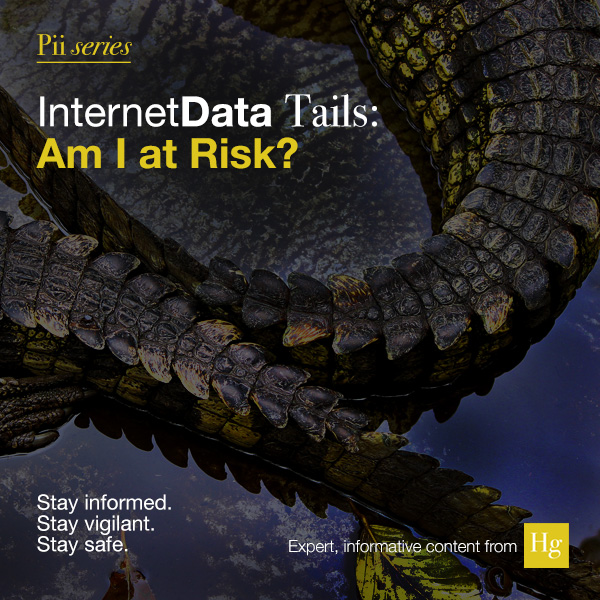By Cynthia Hetherington
 Data, at its most annoying, is a commodity with social media sites selling your Likes to data providers. Data, at its most dangerous, allows terrorists and scammers—as near as your neighbor or from faraway lands—to farm from open sources the personal addresses of our military personnel to threaten them and their families. They robocall mercilessly and prey on the elderly. Unfortunately, we share much of the data that generates these annoyances and threats
Data, at its most annoying, is a commodity with social media sites selling your Likes to data providers. Data, at its most dangerous, allows terrorists and scammers—as near as your neighbor or from faraway lands—to farm from open sources the personal addresses of our military personnel to threaten them and their families. They robocall mercilessly and prey on the elderly. Unfortunately, we share much of the data that generates these annoyances and threats
In this blog series, we help you understand the dark side of information sharing. You will learn the pitfalls of oversharing and how to reduce your online risks. You will gain useful tips for protecting your personally identifiable information (PII) and preventing identity theft, learn how to opt out of online vendors and how to remove you PII from three major DNA collection retrieval services.
Take the Test
We generate a good deal of the information found in online databases due to our inclinations for simplicity, discounts, and connectivity. For instance, does your keychain look like holiday garland with commercial value cards dangling from it? Gliding through the airport, do you advertise who you are with easily visible bag tags displaying your status and address? Are you or your family members regularly checking Facebook and Instagram feeds from a smartphone or a laptop? Is your wallet bulging with credit and/or debit cards and not dollars? Do your home and cell phones receive unsolicited offers or scam calls? Is your postal mailbox full of unsolicited offerings? If any of these scenarios applies to you, you are oversharing your information.
Want to get a sense of how much information you generate and spread during an average day? Try the following offline example: Over the course of a week, keep a journal of all the times you share your name, address, phone number, or credit card number on- and offline. How often you drive a car through a tollbooth with an automated payment system such as E-Z Pass or Fast Pass? How often you Like your friend’s social media posts? How often you use a grocery store coupon card? How often you pay your bills online? How often you answer unsolicited email?
After this exercise, you may think that completely removing yourself from the online world would be insurmountable. Paying for goods and services with a credit card, automated toll stations, and having a minicomputer, i.e., your mobile phone, in the palm of your hand are some of the practical, modern conveniences you rely on almost daily. Give them up? Not likely.
Oddly enough, such personal information has always been readily available—although it required investigative experience and/or a serious commitment to locate these types of details through county courthouses, administrative offices, and other public record venues. Since the advent of the easily accessible and always available World Wide Web, public record companies have become accessible to everyone, with over 100 such companies in the U.S. alone. These companies will locate individuals and share personal details about where they live, who lives with them, their ages, and so on, for anyone interested in finding out.
Our series, Info Exposed, is meant to help you to facilitate your personal privacy in a very open online world. There is no one solution, no one vendor, that has all the answers. The best security practices start at home. Using our tips as a guide, you can begin to remove, obstruct, or obscure the open source information that leaves you and your family vulnerable online. The entire report, Information Exposed, is also available to download for free.

Are you an analyst or investigator looking for advanced OSINT training on risk assessment and risk monitoring? If so, check out Hg’s webinar series, where you can attend live sessions and receive CEUs or watch previously recorded sessions to beef up your investigative skills.
 Are you concerned about your company’s or employees’ points of vulnerability through online and open sources? Our skilled analysts are experts at removing personal information that puts you, your business partners, and your family at risk. Learn how our team can assist you in assessing and monitoring your risks.
Are you concerned about your company’s or employees’ points of vulnerability through online and open sources? Our skilled analysts are experts at removing personal information that puts you, your business partners, and your family at risk. Learn how our team can assist you in assessing and monitoring your risks.
 Cynthia Hetherington, MLS, MSM, CFE, CII is the founder and president of Hetherington Group, a consulting, publishing, and training firm that leads in due diligence, corporate intelligence, and cyber investigations by keeping pace with the latest security threats and assessments. She has authored three books on how to conduct investigations, is the publisher of the newsletter, Data2know: Internet and Online Intelligence, and annually trains thousands of investigators, security professionals, attorneys, accountants, auditors, military intelligence professionals, and federal, state, and local agencies on best practices in the public and private sectors.
Cynthia Hetherington, MLS, MSM, CFE, CII is the founder and president of Hetherington Group, a consulting, publishing, and training firm that leads in due diligence, corporate intelligence, and cyber investigations by keeping pace with the latest security threats and assessments. She has authored three books on how to conduct investigations, is the publisher of the newsletter, Data2know: Internet and Online Intelligence, and annually trains thousands of investigators, security professionals, attorneys, accountants, auditors, military intelligence professionals, and federal, state, and local agencies on best practices in the public and private sectors.



